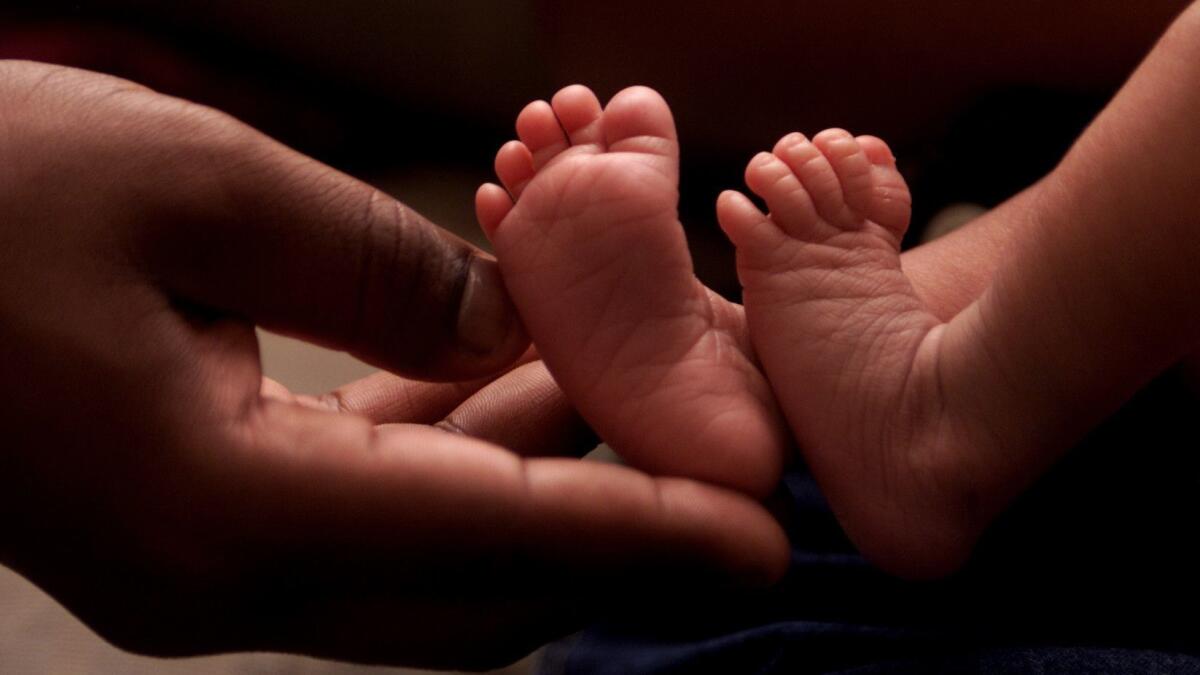Op-Ed: Does the Indian Child Welfare Act protect tribal interests at the expense of children?

When Chad and Jennifer Brackeen received a call in June 2016 from a child welfare worker asking if they would be willing to take in a 10-month-old foster child, they did not hesitate. They had two biological sons and had already had one foster placement that lasted about five months. But this baby was different.
“We were told that because he was an Indian child, he would only be with us for a couple of months and then would be moved to an Indian family,” Jennifer Brackeen recalls.
Brackeen, a physician, and Chad, a stay-at-home father, understood that according to the Indian Child Welfare Act, which was passed in 1978, the rules about adoption and foster care were different for children from Native American families. What they didn’t realize was the lengths to which tribes — in concert with the federal government — go in putting the interests of the tribe over the interests of the child.
The Indian Child Welfare Act was originally intended to prevent social workers from removing Indian children from their parents and placing them with white families simply because of poverty or bigotry. Over time, though, the ICWA has called into creation a separate and unequal child welfare system. In effect, Indian foster children — regardless of whether they live on a reservation, regardless of much or how little of their DNA is Native American, even regardless of their biological parents’ wishes — may be adopted only by other Indians.
Preference for adoptions goes first to family, which is the same for non-Indian adoptions. But once family ties are exhausted, children must be placed next with members of their tribes, and then with “literally any other Indian in the country,” as Jennifer Brackeen notes with exasperation.
Indian children can be taken from an adoptive home up to two years later, if an Indian family emerges to take the child.
Last week, 40 years after the original statute was passed, a U.S. district court judge in Texas ruled in favor of the Brackeens and two other families, declaring the ICWA unconstitutional. This decision, which will be appealed, along with other recent cases in California and Ohio that have reached contradictory conclusions, suggests that the law will be headed to the Supreme Court soon.
The Brackeens’ child, referred to in court documents as Baby A.L.M., had been born with drugs in his system and removed from his parents because of neglect. In May 2017, almost a year after the Brackeens began fostering Baby A.L.M., his mother relinquished her parental rights. His father didn’t show up at the hearing so his rights were severed.
During those 11 months, child welfare officials failed to come up with a single other family who wanted him, let alone someone from the Navajo or Cherokee tribes whose ancestry he shares. But officials continued to tell the Brackeens they couldn’t adopt Baby A.L.M., even though, by then, the Brackeens were the only parents he knew.
A couple of months later, the Brackeens received word that a Navajo couple in Albuquerque was interested in adopting Baby A.L.M. After the child spent just two hours with the couple, officials announced it was a done deal, the 2-year-old would shortly be put on a plane to New Mexico. Despite the fact that everyone who knew the boy supported his adoption by the Brackeens — his biological parents, his paternal grandmother who had raised him until he was 10 months old, the government’s guardian ad litem for the child, and a court-appointed special advocate — a family court judge ruled against them based on the ICWA.
In October 2017, the Brackeens, along with other foster families, filed a federal lawsuit. As it happened, the New Mexico couple backed out of adopting Baby A.L.M., and tribal officials withdrew their objections to the Brackeens’ adoption as well. Nine days short of the child’s third birthday, Baby A.L.M. was adopted by the Brackeens. But they proceeded with the lawsuit, not least because even after an adoption, the rules for Indian kids are different. Although most adoptions can be reversed only up to six months after placement, Indian children can be taken from an adoptive home up to two years later, if an Indian family emerges to take the child.
Lawyers for the Brackeens and the other families (some of whose adoptions are still pending), as well as attorneys general from Texas, Louisiana and Indiana who joined the suit, argued primarily that the law discriminates on the basis of race. The defendants, including the Cherokee Nation and other tribes as well as the federal government, responded by claiming, as they have in the past, that Indian tribes are individual political entities — analogous to nations, not racial groups.
Enter the Fray: First takes on the news of the minute from L.A. Times Opinion »
The plaintiffs successfully countered that if each tribe is a single political entity, and that entity should have precedence over adoptive parents from other groups, why does the ICWA allow Indian kids to be adopted by any native family, from any tribe? If the goal is to preserve a child’s heritage, how is that accomplished by sending him to live with members of another tribe or putting hundreds of miles between a child and his biological relatives?
The judge also agreed with the plaintiffs’ novel argument that the ICWA is unconstitutional because it violates principles of federalism by “commandeering” state child welfare agencies and courts to carry out the will of the federal government.
Baby A.L.M. is now almost 4 years old and thriving. The Brackeens hope their lawsuit will contribute to more such outcomes for Indian children in foster homes. But until the Supreme Court strikes it down, the ICWA is still the law of the land.
Jennifer Brackeen says that until that changes, if her family has the choice of whether to take in a native child again they would “almost certainly say no.” In her view, the ICWA creates a system that she doesn’t want to be a part of. It leaves Indian children in foster care for long periods (longer than is allowed for children of any other race) while officials seek native families to take them in. And when it can’t find them, the law ignores the family bonds that have formed in foster care.
Sadly, there are Indian children in state custody all over the country — poverty, domestic abuse and drugs affect native children disproportionately. The Indian Child Welfare Act makes it far too difficult for them to get a solid second chance.
Naomi Schaefer Riley is a resident fellow at the American Enterprise Institute studying child welfare issues.
Follow the Opinion section on Twitter @latimesopinionand Facebook
More to Read
A cure for the common opinion
Get thought-provoking perspectives with our weekly newsletter.
You may occasionally receive promotional content from the Los Angeles Times.






